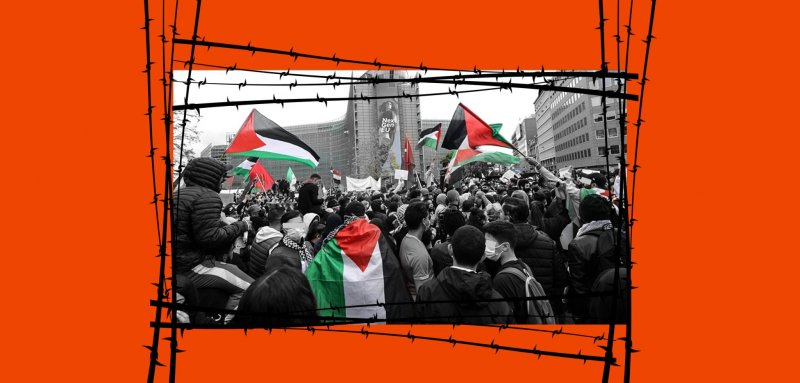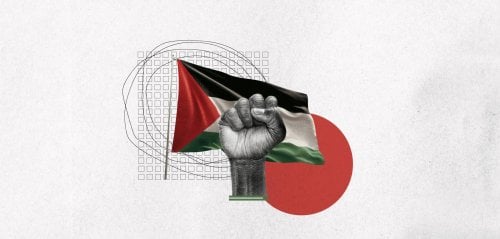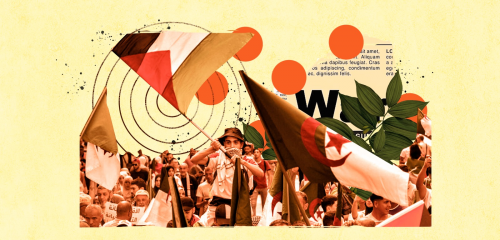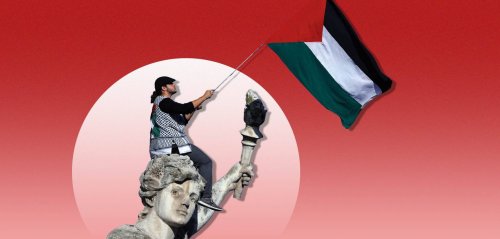We’re in overwhelmingly desperate times. There are not enough sighs, handwringing, fist-banging, X (Twitter) rants, columns, chants, sobs or pleas that can truly convey the extent of the anguish felt by so many around the world watching the relentless killing of Palestinians.
The temptation to repel the suffocating helplessness by disappearing, disconnecting, diving into the nearest hole until the horror is over is large and looming. But there’s a corollary to the debilitating pain; a galvanized activation among swathes of people that’s appearing like the lighthouse in humanity’s dark hour.
Across the globe, the Palestinian flag waves in honor of the hundreds, the thousands, the millions of dispossessed. The chants grow louder and more songful as we mourn our sacrificed souls. We will never be the same again. Forever changed by the missiles of hatred shredding our hearts, a treacherous path towards freedom has exploded in front of us and we have little choice but to march down it.
Protesting is as much about identifying who your allies are and how you can work with them as it is about being vocal with your disdain for government policies. It is also the well from which we – the grieving, the anxious, the triggered, the overwhelmed, the fearful, the activated, the lonely – refill ourselves with hope.
For the diaspora kids, this moment has been their parent’s life work. Exiled, stateless, yearning and broken, they replanted the seeds of their resistance in new earth. For all the tears we saw our parents hold back, for all the emotions they withheld, for all the battles they won, for all the losses they accepted, for all the promises that were broken, for all their absences we endured, for all the lives forever changed – we carry their fight forward.
From sit-ins across the capital’s train stations and social media campaigns to information resource building and media complaints, initiatives meant to strengthen Palestinian solidarity and protest are widespread.
Weekly protests for Palestine and the plethora of cultural and intellectual events that have mushroomed around London since October 7th have given much-needed time and space for people to express themselves and to identify, connect and coordinate with friends of the movement. I’ve always been of the belief that protesting is as much about identifying who your allies are and how you can work with them as it is about being vocal with your disdain for government policies. It is also the well from which we – the grieving, the anxious, the triggered, the overwhelmed, the fearful, the activated, the lonely – refill ourselves with hope. From the fountain of collective love and compassion for Palestine, we recognize that we are not alone and that we are not so powerless.
Across the globe, the Palestinian flag waves in honor of the hundreds, the thousands, the millions of dispossessed. The chants grow louder and more songful as we mourn our sacrificed souls. We will never be the same again.
If the reason weren’t so tragic you could boast about the fullness of the Arab diaspora’s social calendar. Every day brings another fundraiser or talk with speakers, musicians, writers, intellectuals and policymakers offering their time, skills, commitment and faith in the Palestinian cause to commiserate, educate and celebrate the resistance to occupation and ethnic cleansing.
People are connecting and working across multiple platforms and on several issues using various tactics. It's modern digital activism meets a history of passion and pain.
In the large WhatsApp community group that I am a part of, what first started as a group of friends coordinating a breakfast bite before the first march quickly evolved into a growing group of more than 200 people connecting with one another and organizing on Palestine in the UK. Whether its letter-writing to MPs, complaints to media teams, fundraisers for medical aid to Gaza, vigils, grief circles, legal help, resource building, content creation, social media posting, shadow-ban workarounds and beyond, the width and breadth of activist work currently happening has been healing to witness and inspiring to be a part of.
I imagine this fired-up focus is what my father’s generation felt in the 1960s and 1970s, amid the Arab world’s successive coups and two seminal wars with Israel. Each time more of Palestine was lost and broken regimes suppressed their way into forever power using that ‘forever’ enemy as a ghoul. Will that be our fate now? It almost seems inevitable that Gaza will be swallowed up by the Zionist military machine. Many of us realize that the pearl of the Palestinian Mediterranean has been sacrificed for the greater goal of universal justice and freedom. But will we attain it?
My dad was jailed for his oil strike action and public speeches in Libya during the six-day war of 1967. A Palestinian-born and raised Libyan, he lost 2.5 years to prison and was robbed of being with his sick mother before she died.
What will we all lose for Palestine?
My father was released from prison a month before the 1969 military coup in Libya. The monarchy was replaced by a republic and that revolutionary former inmate became its first Prime Minister. By the time of the Yom Kippur War in 1973, the Libyan king who had imprisoned my father was in exile and his former prisoner was representing the Libyan government in the UK. Then a few years later, my father established a Libyan opposition movement in exile against Moammar Qhaddafi’s dictatorship.
The wind goes in ways we cannot ever fully know so we must always fly our flags high enough to catch it. But still, what will become of us? This justice-seeking, peace-loving, beer-drinking, rabble-rousing, hip-shaking, ear-chewing, loud-speaking caravan of light-bearers fighting to break free? And what will become of us all if we don’t?
It is probably pointless to ask such questions and dangerous to know the answers. For in this violent carnage, it is far too easy to get sucked into a paralyzing despair. I am moved to act because not to would be a complicity in the murder of my values, my culture, my history, my identity, my power and my peace. Is there really a choice when it is a matter of survival?
As a journalist, you’re meant to be objective and removed from the story, but I cannot erase my own history as the descendent of a Nakba survivor nor can I resist the call to act in any way that can alleviate the suffering of one of the worst ongoing injustices of our era.
This on-going genocide has turned as all into activists, whether we intended to or identify as such. For many of us, it feels merely like the minimum we can and must do. In the early days of this onslaught, I listened to a conversation on The Markaz Review with Hisham Bustami and Moustafa Bayoumi, two Arab intellectuals who were discussing the role of the intellectual in modern society, particularly considering the current war.
In a previous article, The Vanishing of the Public Intellectual, Bayoumi had questioned whether “public intellectuals even exist anymore?”
“Do publics exist? Everywhere you go, the forces of power seek to atomize us away into marketable metrics, Facebook groups, random and randomized individuals, software-recognizable faces. Who are we, but clicks, trends, and lifestyles. We are everything but a public,” he wrote.
During the talk, Hisham Bustami expanded on the dilemma of being a passive, observant intellectual during a time of upheaval and necessary change. He suggested that the role of writers, thinkers, academics and the like needed to evolve into a marriage of the cerebral and the corporal to become a “participating thinker”.
Bustami’s suggestion helped me understand and accept the role I had been carving out for myself with some trepidation. As a journalist, you’re meant to be objective and removed from the story, but I cannot erase my own history as the descendent of a Nakba survivor nor can I resist the call to act in any way that can alleviate the suffering of one of the worst ongoing injustices of our era.
And so, I now see myself as the participating intellectual Bustami encourages more of us to be. I’m an activist through my writing on topics and perspectives that I would, and do, stand physically behind through marches, protests and organizing. Everyone can be a participator in their field – a participating techpreneur who lends their knowledge to digital activism, a participating photographer who directs their lens to the Palestinian plight, the participating chef who uses their table to open hearts to a threatened culture, the participating doctor who gave over his whole voice for the unheard people of Gaza.
What I see today in London and across the globe are Individuals tapping into their power within a collective framework of support. In doing this, they are also protecting the notion of publics as a “force of change” which Bayoumi warns are critically endangered.
“The really frightening thing we are losing today is not the intellectual. The really terrifying loss to our planet is the notion of a public unified for the public’s good. That’s the thought they don’t want us to have. And that’s the thought we must always make thinkable.”
In this violent carnage, it is far too easy to get sucked into a paralyzing despair. I am moved to act because not to would be a complicity in the murder of my values, my culture, my history, my identity, my power and my peace. Is there really a choice when it is a matter of survival?
Resistance movements, particularly Arab ones, are often criticized for their fragmentation but I also happen to think that the decentralized nature of so much of the activist work I have observed or been a part of is helpful. The lack of attractive or viable leadership in Palestine makes affiliation with any of its political entities uninviting. The steady dismantling of Palestinian civic society programmes in Palestine and abroad that happened in the decades following the failed Oslo Peace Accords has hollowed out pre-existing infrastructures. All the Palestinian activism that is currently taking place is spearheaded by individuals who are passionately committed to using their energy, humanity and skills to bring about justice for Palestine. Whether they’re organising a vigil, a press conference, an ad hack (advertising hack) campaign or petitioning MPs, these individuals tap into their networks for support, exposure and momentum, building larger connected communities of Palestinian solidarity in the process.
Few are ignorant to the magnitude of this fight and the overwhelmingly strong forces on the other side, and it is a hard ring to step into when many of those same activists are also grieving the loss of life and identity or who are being harassed and censored.
Thankfully, I have also witnessed an incredible outpouring of inter-communal emotional, mental and physical support. Grief circles, fundraisers, concerts, networker events and even traditional dabke dancing classes have all been opportunities for allies to safely express, release and transform their complex pain.
Whether socially or politically, community has been the safety net our broken spirits have fallen into and where many of us have found the recharging life force to continue in our efforts to liberate Palestine.
* The views and opinions expressed in this article are those of the author’s and do not necessarily reflect the official policy or position of Raseef22
Raseef22 is a not for profit entity. Our focus is on quality journalism. Every contribution to the NasRaseef membership goes directly towards journalism production. We stand independent, not accepting corporate sponsorships, sponsored content or political funding.
Support our mission to keep Raseef22 available to all readers by clicking here!
Interested in writing with us? Check our pitch process here!






